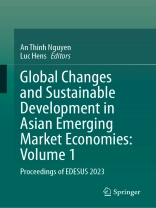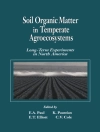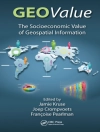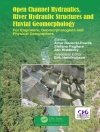This two-volume set presents the conference papers from the 2023 iteration of the International Conference on Economics, Development and Sustainability (EDESUS 2023), organized by the VNU University of Economics and Business, Vietnam National University, Hanoi. The collection addresses global changes and sustainable development in Vietnam and other emerging market economies in Asia, and covers wider topics such as economics and business (e.g. economic theory, national and international income distribution, macroeconomic policies, sectors of economy, productivity developments, financial market, business governance, bank financing), development and sustainability (e.g. developing process, development policy, public policy, sustainable growth, sustainability tools, sustainable livelihood, sustainable tourism, green growth), and resources and global change (e.g. human resources, natural resources, climate change, globalization, global challenges). The books are of interest to professors, researchers, lecturers, and students in economics and geography, consultants, and decision makers interested in global changes and sustainable development.
Volume 1 focuses on economic development in Vietnam and other emerging market economies in Asia. This covers topics such as economics and business (e.g. economic theory, national and international income distribution, macroeconomic policies, sectors of economy, productivity developments, financial market, business governance, bank financing) and development studies (e.g. developing process, development policy, public policy, green growth).
Inhaltsverzeichnis
Chapter 1: Patterns of alcohol expenditure in Vietnam: Implications for Anti-alcohol policies.- Chapter 2: The vulnerability-poverty nexus: evidence from two coastal fishery communities in Central Vietnam.- Chapter 3: The relationship between corporate social responsibility.- Chapter 4: Policy proposals for management of public services.- Chapter 5: Institutions, sustainable agricultural intensification, and the quest for zero hunger: lessons for emerging economies.- Chapter 6: Policy analysis and evaluation of education administration in Vietnam.- Chapter 7: New regulations on early childhood education development policy.- Chapter 8: Policies for motivating students to learn.- Chapter 9: Education policy analysis methods.- Chapter 10: Public policy analysis contents and methods.- Chapter 11: Overview of public policies.- Chapter 12: Forecast on Vietnamese education in market economy conditions‘.- Chapter 13: Impact of macroeconomic indicators and resources on Vietnam’s economic growth.- Chapter 14: Structure and characteristics of the current social security system in Vietnam.- Chapter 15: Solve social problems arising in the process of economic growth in Vietnam today.- Chapter 16: Does sustainability supply chain risks management intensify smart sustainable circular supply chain for the post-pandemic preparedness? Insight into the enabling role of Cloud-based accounting information systems integrated with blockchain and artificial intelligence.- Chapter 17: Linking intelligent green accounting system with sustainable green practices in driving the sustainability performance of small and medium enterprises: Empirical evidence from an emerging country perspective.- Chapter 18: Education inequality during and after the COVID-19 pandemic: A theoretical framework development.- Chapter 19: The feasibility of adopting robot tax in developing countries: an analysis from a Vietnamese perspective.- Chapter 20: Impacts of Covid-19 to the online shopping intention of Vietnamese consumers.- Chapter 21: The effects between social sustainability and performance outcomes in sustainable development. the case of SMEs in Vietnam.- Chapter 22: Interactions between landscape dynamics, sloping lands and rural non-farm livelihoods among Hmong farmers in the Bac Ha mountains (Vietnam).- Chapter 23: The corruption – innovation nexus: evidence from developing economies.- Chapter 24: Land grabbing and its impacts on local livelihoods in southern Laos: a case study as Keng Nyai village in Attapeu province.- Chapter 25: Establishing a carbon market in Vietnam.- Chapter 26: Climate change: impact assessment process and responding in strategy, planning.- Chapter 27: Evaluation the level of plastic recycling – a case study in Hanoi.- Chapter 28: Community-based eco-tourism (CBET) at Ngan Thuy commune, North Central Coast of Vietnam: development based on tourism and local people’s perceptions.- Chapter 29: The capital structure choice in the Vietnam’s stock market.- Chapter 30: Lean management for public universities Central Vietnam.- Chapter 31: Livelihoods of migrant workers and the early impact of Covid-19 in Hanoi: a qualitative study.- Chapter 32: The feasibility of adopting robot tax in developing countries: an analysis from a Vietnamese perspective.- Chapter 33: The current situation of strategic leadership personnel in Nghe An province, Vietnam.- Chapter 34: Indigenous knowledge of the christian minority adapting to climate change in Nam Dong district, Thua Thien Hue province.- Chapter 35: Globalization in the context of US-China competition and its prospects.- Chapter 36: Vietnamese consumers attitudes toward green products: the case of healthcare products.- Chapter 37: Livelihood strategies of coastal farmers under the context of climate change: a case study in the coastal areas of Thai Binh province, Vietnam.
Über den Autor
Assoc. Professor Dr. An Thinh Nguyen is the Dean of the Faculty of Development Economics at VNU University of Economics and Business, Vietnam National University, Hanoi. He also currently acts as the Vice-President of the International Association of Landscape Ecology in Vietnam region (VN-IALE). His research focuses include geography of Vietnam, human geography, environmental economics, and mountainous landscape ecology.
Professor Em. Dr. Luc Hens is a Belgian human ecologist who has been performing and supporting research on sustainable development and climate change policy instruments in Vietnam for over 25 years. He worked at the ”Vlaamse Instelling voor Technologisch Onderzoek” (VITO) which is Belgian’s largest environmental research organization. Professor Hens has published over 130 papers in international peer reviewed journals. He has also published in local Belgian and Dutch scientific journals, and (co-)edited over 40 books with international distribution.












